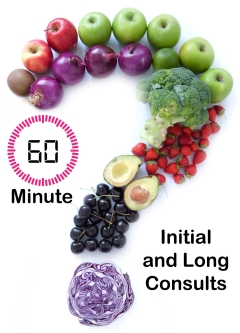DrCarney.com Blog
Do You Know Which Foods are Healthiest?
When it comes to nutrition, one of the most interesting phenomenon to me is the number of people with lifestyle-based health issues who believe that they eat a "pretty healthy diet." But I totally understand this. I truly believed I ate a "pretty healthy diet" back in the days of my lacto-ovo vegetarian diet. (That means I ate milk products and eggs, but no meat or fish.) Even though I carried extra pounds and suffered from asthma, regular sinus infections, and occasional constipation, I thought my diet was pretty good. I assumed that my health issues were either genetic or due to aging. I didn't think that cheese, white pasta, or olive oil — which were all dear to my Italian-American heart — had anything to do with my health issues. And I certainly didn't think it was the eggs or Tater-Tots in my diet that were causing me any problems!
Imagine my surprise when the weight almost melted off and the other conditions became manageable once I dropped the oil and adopted a low-fat, whole-foods, plant-based diet. My problems had largely been due to my diet after all. Sure, I had genetic tendencies to certain conditions, but when I took away the foods that were hurting my body, I began to enjoy optimal health. Today, I still live with some of the results from the years of diet damage I did to my body before I learned better, but I now feel great and can expect to feel this way for years to come!
What We Think We Know About Nutrition
Recently, the New York Times conducted an interesting survey. They asked hundreds of nutritionists and a representative sample of the American electorate to rate around 50 different food items. The survey revealed which foods nutritionists consider healthy versus which foods the public considers good for us. The results are telling. There was a big gap between the public's perception and nutritionists' beliefs with regard to some common foods. Here are some examples:
Foods the public thought were healthy, but the nutritionists disagreed:
Nutritionists Public
- Granola Bar 28% 71%
- Coconut Oil 7% 72%
- Frozen Yogurt 32% 66%
- Granola 47% 80%
Foods nutritionists thought were healthy, but the public rated less nutritious:
Nutritionists Public
- Quinoa 89% 58%
- Tofu 85% 57%
- Hummus 90% 66%
Foods that both groups were undecided on:
Nutritionists Public
- Popcorn 61% 52%
- Whole Milk 63% 59%
Good Nutrition Shouldn't be a Mystery
One doesn't need a nutritional degree to understand the basics of optimal nutrition. Unfortunately, there are so many diet gurus, special interest groups, and food companies out there advertising their ideas or products as "the healthiest" that we all tend to get confused. Even after I received my medical degree, I wasn't prepared to cut through the misinformation and outright lies about what foods are best for us. I had to educate myself on nutrition and live the admonition "Physician, heal thyself" before I could help my patients reach their full health potential. I am indebted to the work of doctors John McDougall, Neal Barnard, Caldwell Esselstyn, T. Colin Campbell, and registered dietitian Jeff Novick, among others, for teaching me how to determine which foods are best for the human diet. My passion now is to help spread the news that optimal nutrition is easy to understand and optimal health is easy to achieve.
How do We Know if Our Diet is Healthy?
If I had to condense a healthy diet into just one word, I'd say "FIBER." Our body was designed to thrive when we eat naturally fiber-rich, whole foods. Incidentally, these foods are also the ones that have the most vitamins, minerals, antioxidants, and phytonutrients. And foods that naturally contain fiber are also rich sources of protein, carbohydrates, and natural fats — the macronutrients our body requires. Therefore, looking for foods with fiber will simultaneously optimize all the other elements we need for a healthy diet.
Animal products have absolutely no fiber. Eggs have no fiber. Milk has no fiber. Beef, chicken, pork, and fish have no fiber. So even before we talk about the inflammation they cause or about the amount of cholesterol they contain, we can eliminate animal products from a healthy diet just due to their lack of fiber.
Only plant foods contain fiber. But although all plant foods start out with fiber, not all of them are healthy by the time they reach our plate. Processing disrupts the natural fiber in plant foods, separating fiber from the nutrients it was naturally bound to and often removing the fiber all together. When fiber is removed, calories become more concentrated. And without being bound to fiber, the simple carbohydrates in plant foods are accessible to our bodies for quick absorption. When simple carbohydrates hit our bloodstream, our blood sugar spikes, signaling our pancreas to pump out insulin. Our liver gets the message and IGF-1, a growth hormone, quickly rides along with the insulin surge. The lack of intact fiber in processed plant foods sets us up for lifestyle diseases like diabetes, obesity, cardiovascular disease, and some types of cancer.
Eating whole plant foods is the answer. When we begin to think of our food in terms of "From Sun to Plant to Plate," we are beginning to understand how to optimize our diet and our health. Whole plant foods that come from the farm — without a detour through a factory — are the foods that offer us the most health for our dollar. If we want to optimize our health, we'll choose edamame over a heat-and-eat, soy-based, veggie patty. We'll have a baked potato rather than Tater-Tots, which are filled with vegetable oil, a highly processed plant food. And we'll enjoy the juicy tang of a whole orange rather than pouring a glass of juice that was processed in a factory hundreds of miles away.
My article, Food Processing Made Simple, goes into detail about the ways plant-foods are processed. As we begin to recognize the different levels of processing, we learn to choose plant foods that optimize our health as well as help us manage our weight.
A Starch-Smart® Perspective on the Survey
So, what do I think about the foods in the New York Times survey? Well, since most granola bars are made with several forms of sugar and added fats— which are processed, concentrated foods, we refer to them as "candy bars" at my house. Coconut oil is a highly processed plant food that is also loaded with saturated fat, so that's definitely not a health food. All forms of dairy yogurt are obviously unhealthy due to their being of animal origin. And the only granola I recommend is one made without oil, like this one from StraightUpFood.com.
I agree with the majority of nutritionists that quinoa is a wonderful addition to any diet. Water-packed tofu made from whole soybeans is a nutritious food that can be eaten in lots of ways; I recommend that it be used only occasionally since it's naturally high in fat. And hummus is a great dip, spread, or even salad dressing, provided it's made without oil.
While whole milk is out of the question for an optimal diet, I give popcorn a big thumbs up. As long as popcorn is not a vehicle for butter or oil, it is a whole plant food that can be very satisfying. Air-popped corn dusted with nutritional yeast and a little salt has saved many a newly-converted whole plant-food eater from diving into a bag of potato chips.
The Proof is in the Living
Years ago, I might have quoted that axiom more traditionally: the proof is in the pudding. But I traded in the typical dairy and oil-laden pudding for a life of vibrant health. I no longer have to tell people that my diet is "pretty good" while I'm sniffling with a sinus infection. And my patients who follow a Starch-Smart® System diet don't have to try to convince anyone that their diet works when it's obvious that their weight is under control and their health issues are improving or gone altogether. A low-fat, whole-foods, plant-based diet speaks for itself. And while science backs up a plant-based diet, I believe that the strongest proof is in the living.
Additional Information:
(1) A Child Needs a Healthy Diet to Build a Healthy Brain
(2) Healthy Food = Healthy Colon
(3) Healthy Diets Start in the Womb
One Hour Phone Consult with Dr. Carney

Telephone Food Coaching Sessions with Linda Carney MD
Due to demand for nutritional advice, Dr. Carney's offers Starch-Smart® System "Dietary Care Extraordinaire" Food Coaching telephone sessions. The first sessions is always one hour. Subsequent sessions can be thirty minutes or one hour:
Click Here For 60 Minute Food Coaching Session
Please Note: Food Coaching sessions are not medical appointments and are not intended to replace your own physician. No tests will be ordered and no prescriptions will be provided.
Preview the "Perfect Health Requires Perfect Circulation" Trailer
Blood Flow Boosts Vitality: Do factors that affect artery linings create or ease your aches and pains? Explore the link between impaired circulation and health challenges. How does blood flow relate to health troubles? Learn how Dr. Carney's science-based Starch-Smart® System can improve your circulation and overall health by nourishing endothelial cells at the start of your day.
When you subscribe to the blog, we will send you an e-mail when there are new updates on the site so you wouldn't miss them.




